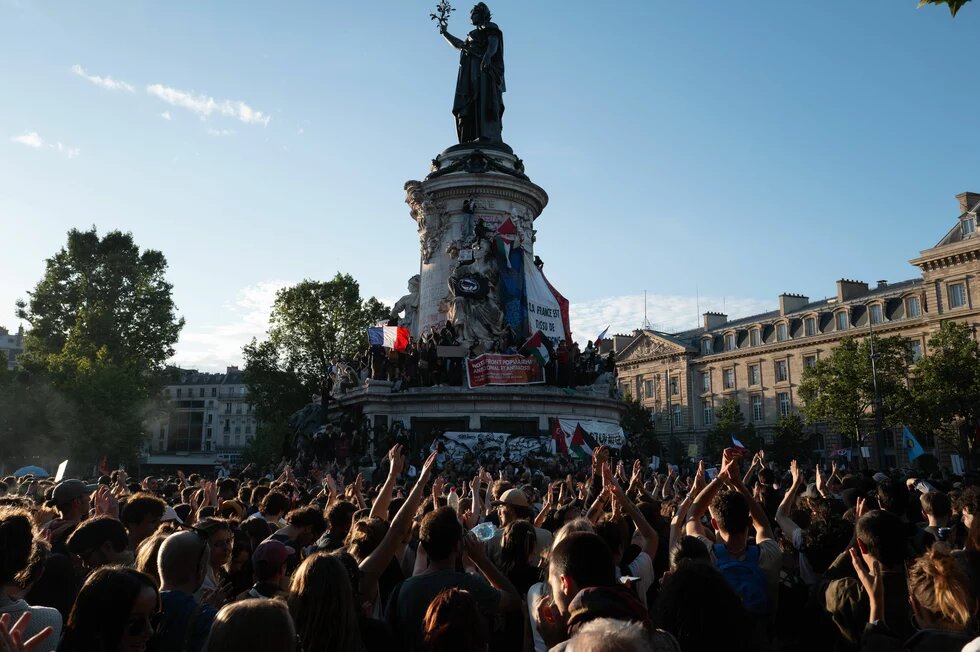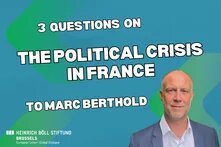The far-right Rassemblement National has surprisingly suffered a defeat in the French snap parliamentary elections - there is great relief in the country itself and also in the EU. However, forming a government could be complicated and take time, with France facing a phase of political paralysis. Marc Berthold, Director of the Heinrich-Böll-Stiftung's office in Paris, explains in this interview which constellations are possible and to what extent France's position in the EU could change.

Nicole Sagener: The left-wing alliance Nouveau Front populaire (New Popular Front, NFP) has surprisingly emerged as the winner of the second round of the parliamentary elections in France, while Emmanuel Macron's alliance Ensemble came second and Marine Le Pen's far-right Rassemblement National (RN) third. How did such a turnaround come about despite all the predictions?
Marc Berthold: There was - and this is one of the positive aspects made visible by the decision to hold new elections - an enormous mobilisation of civil society in the run-up. It was clear to everyone that the aim now was to prevent the RN from taking power. Even football players from the French national team spoke out. For the second round of voting, the New Popular Front and Macron's ensemble agreed in most constituencies not to run against each other if only one of the two parties had a chance of winning against the Rassemblement National. Finally, the voter turnout was very high by French standards at just under 67 per cent - the proportion of first-time voters alone was 20 per cent higher than in 2022. The fact that the New Popular Front was ultimately ahead overall was nevertheless a surprise for everyone.
Why did voters ultimately reject a far-right government?
In recent years, many people have observed in other countries what it means when populists or the far right govern - Brexit and its consequences, Viktor Orbán’s reorganisation of the state in Hungary, Donald Trump's time in government. The concrete idea of a far-right Rassemblement National at the gates of power has frightened many - despite Marine Le Pen's strategy of presenting the RN as somewhat tamer and herself as more statesmanlike.
Another decisive factor was probably that some regional RN candidates exposed their ignorance of their own party's policies and programme and their crude theories. According to analyses, this really put off voters in a number of constituencies.
But the RN has convinced a large part of the population...
The RN has indeed made gains: they have increased their number of seats from 89 to 143, further establishing themselves in the area. They have become the strongest opposition party. The RN has played on fear and put a racist spin on all the major challenges facing France - rising prices, weakening purchasing power, the issue of the climate crisis. Migrants and foreign countries were always to blame.
The great relief at the election result is now followed by the realisation of how complicated it could be to form a government, as none of the three strongest forces have a majority of their own. How likely is it that a minority government will be formed?
The New Popular Front is currently negotiating whom to propose as prime minister. If they decide to stay together and form a minority government alone and put forward a prime minister, Macron could hardly ignore this. However, his alliance is not really willing to co-operate with the New Popular Front as a whole. Therefore, the question is where majorities could even exist at the moment. It has always been rumoured that it is possible to govern with decrees. Or with Article 49.3, which allows the government to push through a law without a parliamentary vote, as Macron did with the controversial pension reform. However, civil society and left-wing parties took to the streets against this because they felt it was undemocratic. In this respect, the left-wing alliance would lose credibility if it were to utilise these options itself in future.
How important would green issues be if the New Popular Front were to form a minority government?
Questions about how social challenges can be tackled and society pacified will not be able to be addressed without ecological aspects. The climate crisis is very present in France and climate and ecological issues would certainly be more prominent than before with Emmanuel Macron or the RN.
France must ask itself whether it should not go down the path of coalition governments in future.
Alternatively, a coalition could also govern in future - but that has never happened in France before. Why has this been unthinkable until now?
Finding compromises has an extremely negative connotation in France and is seen as a betrayal of the voters. Neither the parties nor society are prepared for what is normal in Germany, for example. France must ask itself whether it should go down the path of coalition governments in future. However, it is questionable whether this would succeed now.
Could a change in electoral law - away from the rigid majority principle and towards a proportional representation system - change anything?
If a debate were to arise about changing the electoral law, the topic of coalition would come to the fore. Because without a majority voting system, the party blocs would no longer exist in their current form. However, this would require a major debate on the need to change the culture of debate, the style of politics and political decision-making - and there is no concrete initiative as yet. It is unclear whether the political landscape can adapt to something completely new so quickly in the current complicated situation. Especially as there are signs that Macron's ensemble could try to stay in power.
Even with a minority government...
Exactly. The first politicians from the presidential party are saying that Ensemble is more or less on a par with the New Popular Front, that the left-wing alliance has not really won.
Marine Tondelier, leader of the French Greens, is currently attracting a lot of attention with regard to a possible majority because she could build a bridge between the traditionally divided Socialists and the far-left party La France insoumise (LFI). How much influence could the French Greens gain?
Marine Tondelier is currently playing a key role in the New Popular Front. She first set this alliance in motion on the evening of the European elections and then, in the second round of voting, initiated the agreement with Ensemble on the division of constituencies. She also wants to open up the Green Party more towards the centre. Tondelier could be very important for the New Popular Front and the tone of the social debate in the coming period: she communicates very clearly and optimistically, but is also open about the fact the current political situation is unfamiliar and carries a lot of responsibility.
As long as there is no government capable of taking action, France will be temporarily absent from the EU.
Is it possible to predict what France's future position in the EU will be? The British historian and journalist Timothy Garton Ash recently predicted in a guest article for DIE ZEIT that France would have a weak, unstable and divided government, which would cause the entire EU to suffer.
As long as there is no viable government, France will temporarily be left out of the EU. However, the Eurosceptic LFI would not provide the Minister for Europe, Foreign Affairs or Defence and the remaining parties of the New Popular Front - the Socialists, the Greens and also the Communists - are very aware of the threat posed by Putin, the responsibility for Ukraine and the importance of a common European foreign policy. Unlike the feared majority in favour of the Rassemblement National, France will not speak with different voices in Europe.
Does this mean that France will not play a destructive role in the European Green Deal either?
I don't expect that, neither under a coalition nor under a left-wing minority government.
What are the next important questions regarding the formation of a government?
Will the New Popular Front agree on a candidate for prime minister and will Macron accept this proposal? Or will Ensemble try to hold on to power? The National Assembly will meet for the first time on 18 July - eight days before the Olympic Games in France. It is understandable that the current government will continue to govern on a caretaker basis until then. However, Ensemble may also be playing for time and hoping to form a minority government itself. In that case, however, large demonstrations and strikes could be expected.



